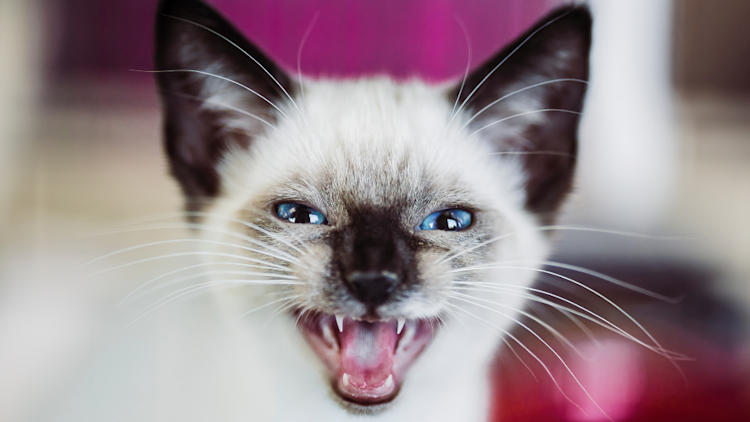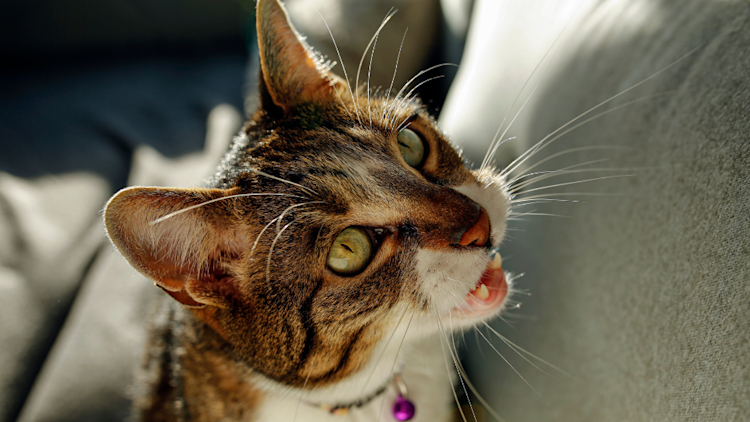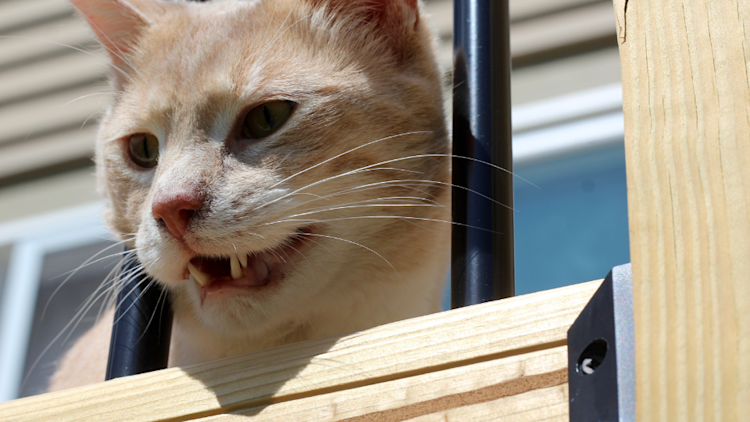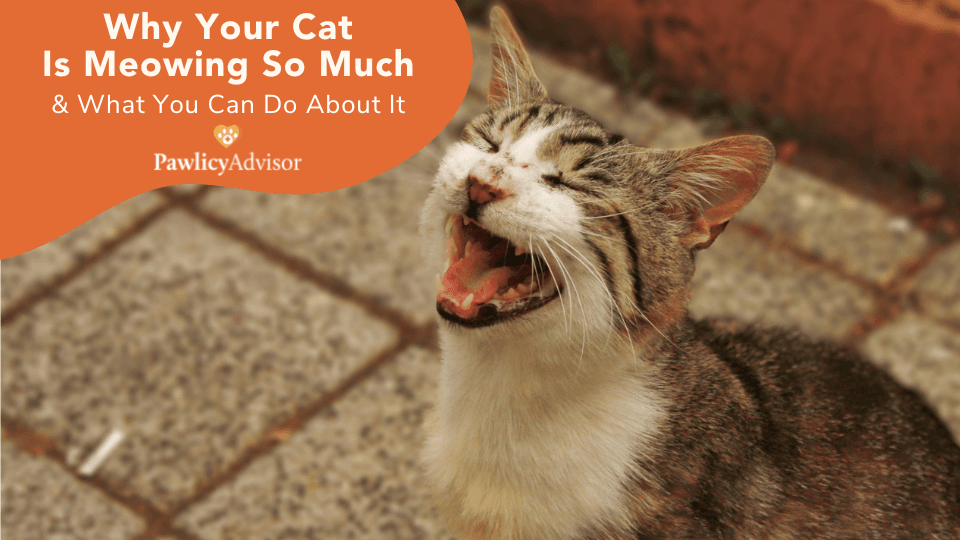Is your new kitten crying all night? Maybe your cat is meowing won't stop meowing all of a sudden? Whatever your case may be, excessive vocalization from our feline friends can be less than fun to deal with.
A few different reasons could explain why your cat is crying at night or howling during the day. Most of the time, the sounds are a happy greeting or a way to get our attention, but in some cases, excessive vocalization could indicate sickness or pain.
Protect Your Cat with Pet Insurance Is Cat Health Insurance Worth It?
Below, we’ll look at why kittens keep crying and cats meow so much, then explain what you can do to help calm your pet and restore peace in your home. Click on a link below to learn more:
- What is excessive vocalization in cats?
- Why does my kitten keep meowing?
- How to calm a crying kitten
- Why is my cat meowing so much?
- How to get a cat to stop meowing
- Key Takeaways
What is Excessive Vocalization in Cats?
Let’s start by establishing what a “normal” amount of meowing is for cats.
Some meowing, or vocalization, is to be expected in kittens. Kittens learn to meow to tell their mother when they’re hungry or cold. As they mature, cats stop meowing to each other and instead direct their vocalizations at humans for various reasons — to communicate a need, say hello, or tell us that something is wrong. Some cat breeds, like Siamese cats, are also known for being more vocal than others, which is something to consider when adopting a cat.1
Cats can also yowl, a vocalization that sounds like a low, guttural moan or long, drawn-out howl. Unlike a typical cat meow, adult cats can yowl at one another to communicate and often do during heat cycles.
Vocalization is a normal cat behavior. However, environmental changes, stress, hormones, and health issues may suddenly increase a feline’s vocalization. At what point a cat’s meowing is considered excessive is a subjective call, but when a kitten won’t stop crying, or a cat meows all night, it can be very frustrating.
Let’s look at some potential reasons why your cat is meowing so much and what you can do to calm your pet down.

Why does my kitten keep meowing?
Kittens can meow for many reasons, from greeting you, getting your attention, and expressing frustration or pain.
Attention
Attention seeking is the most common reason a kitten or cat will meow excessively.
Many kittens learn early on that you will give them some kind of reaction if they meow loudly. Though their vocalization may be impossible to ignore, when you respond by feeding, playing, or petting your kitten, you reinforce their belief that meowing excessively will get them what they want: your attention.
Pain
Kittens have 26 baby teeth that start growing in between two to four weeks old. These deciduous cat teeth eventually fall out to make room for a complete set of 30 adult teeth by six months old. This process can feel rather painful and may cause sensitivities as they adjust.
Kittens are also very prone to accidents around the home, which you might not always witness. Consult your veterinarian to ensure nothing serious is wrong, and take steps to kitten-proof your home to prevent accidents in the future.
Dissatisfaction
Kittens can be fussy about their litter box setup, including the type of substrate used and its location in the home. If your kitten’s litter box is messy or too small, they might cry out in frustration or dissatisfaction as they go near or inside.
Stress
Another possible reason your kitten keeps meowing is a stress reaction. Changes in your kitten’s life or environment — such as getting adopted and moving into a new home or even just repositioning their cat tree — can be stressful for young cats and may cause them to cry more than average.
How to calm a crying kitten
Now you might be wondering, but what can I do to calm a crying kitten? Here are a few suggestions:
-
In the case of attention-seeking, try your best to wait it out and ignore the kitten crying. Once they stop, reward them with a treat or affection. Eventually, your kitten will make the connection that meowing will not achieve the attention they want. Cats can pick up this behavior at any point in life, so always be mindful of how quickly you respond to their demanding cries.
-
If your kitten is less than six months old, it could be meowing out of discomfort. Consider giving them a kitten-safe dental chew to alleviate their pain. If your cat’s gums look red or swollen, or you notice discharge, immediately reach out to your veterinarian because your pet may need medical treatment.
-
If your kitten cries while in or around its litter box, check to confirm they haven’t outgrown the size and ensure it’s cleaned regularly. Make any necessary changes to see if this resolves the problem. If not, consult your veterinarian for further advice and to rule out medical issues, such as a urinary tract infection or blockage, that causes them to cry in pain.
-
Kittens crying due to stress need a safe, relaxing environment to decompress and become comfortable with their surroundings. Designate a cozy space exclusively for them where they can hide out, observe, and sleep without fear. This helps socialize your kitten to their new environment and teaches them how to self-soothe. With patience and time, your kitty’s excessive crying should go away.

Why is my cat meowing so much?
Cats keep meowing no matter how old they are. If your feline’s vocalization is excessive, it may stem from similar reasons mentioned above, but there are other possible explanations for nonstop meowing as cats mature.
Here are some of the most common reasons why your pet cat might be making so much noise:
They Want Something
As with kittens, the primary reason why cats meow is to get your attention when they want something — in most cases, food. Your cat may also be trying to get your attention if they need water or access to their litter box.
They’re Bored or Lonely
Bored, lonely, or understimulated cats may express their frustration by meowing or yowling at night. This is especially common among indoor cats because their environment is less stimulating to their natural predatory instincts. However, if your cat won’t stop crying at night even after they’ve had adequate playtime, it could indicate kidney disease or thyroid issues.
They Feel Threatened
In some cases, a cat yowling all the time can be due to insecurity. If they feel threatened or scared, you might hear excessive vocalization as a means to protect themselves or their space. This is often the case when a new pet is introduced to the home.
They’re Sick or in Pain
Cats can also start to meow more frequently if they develop certain health problems. Elderly cats are particularly prone to excessive meowing if they develop sensory issues or medical conditions that affect their cognitive abilities.3
Cats often mask discomfort they might experience throughout life, but if your pet is in severe pain from an injury or illness, they may begin to express it by meowing or yowling loudly. In both cases, make an appointment with your primary care veterinarian to rule out medical reasons that may be causing excessive vocalization.
They’re in Heat
A pet “in heat” is fertile and ready to mate, which first occurs in female kittens between six and 10 months old. Females in heat are usually much more affectionate, which they may express through excessive meowing, purring, rubbing against you, and more.
During this time, cats may meow a lot because they want to go outside and roam to find a mate. Conversely, if your male cat is yowling through the night, he may be trying to attract a nearby female in heat.
Heat cycles typically last four to 10 days and, unless the female gets pregnant, will recur every two to three weeks. Breeding season typically lasts from February to September, but an indoor cat may stay in heat year-round.3

How to get a cat to stop meowing
Once you’ve identified why your kitten is meowing so much, you can take some active steps to soothe them and reduce the noise.
Here are our top tips to make your cat stop meowing so much:
-
First and foremost, accept that you won’t completely silence your cat. Try not to let their vocalizations annoy you. Many cats meow to say how happy they are to see you; you wouldn’t want to miss out on that! Remember that some cats are more vocal than others and will always “talk,” even when they don’t need anything.
-
The main reason cats obnoxiously meow nonstop is that they’ve learned it gets you to do whatever they want. When your cat becomes excessively vocal, ensure they have access to their water bowl and litter box but don’t feed them unless it’s mealtime. Otherwise, it will result in you overfeeding your cat, which could lead to obesity and secondary health problems.
-
Many owners give into their pet’s loud, incessant pleas for food to make the cat stop meowing, but this only reinforces the behavior. If your cat is constantly meowing for food, you can talk to your veterinarian about switching to a diet rich in fiber that can keep your cat fuller longer.
-
Don’t reward inappropriate behavior by reacting to your cat’s excessive vocalization. Even a negative response — like yelling at your cat to stop meowing — provides positive reinforcement because it gives your pet what they want: your attention. Resist the urge to respond and calmly ignore them instead.
-
If your cat is bored and understimulated, do your part to spend more time with them dedicated to playing. Exercising your cat with active toys like wands or balls can help them stay healthy and keep them entertained. Consider surprising your cat with new toys or stimulation — even something as simple as a laundry bin or box to sit in can be exciting for cats. You can also switch up their typical playtime to keep things fresh.
-
Consult your veterinarian to screen for underlying health issues that may cause your cat to meow so much. Elderly cats are known to meow excessively if they develop certain medical conditions, such as cognitive dysfunction or sensory deficits. A veterinarian can treat these conditions with medication, which may help your cat’s discomfort and reduce their meowing.3
-
A cat crying through the night might be calling out because they are lonely or disoriented and need help finding you — especially if they have already been spayed or neutered, or are older in age. Try winding down with your feline friend before curling up in bed to prevent them from waking you up in the middle of the night.
-
Have your cat spayed or neutered to prevent your female cats from going into heat and male cats from yowling all night to attract a mate. Not only will this decrease the excessive meowing during heat cycles, but cats can also reap other benefits of desexing, such as preventing uterine infections, certain cancers, unplanned pregnancies, and animal overpopulation.
Spaying your cat typically costs between $300 and $500 but offers several benefits and helps control unwanted behaviors. Many pet insurance providers offer pet wellness plans that can help cover the cost of surgery along with other preventive care services.
Enrolling your cat in a pet insurance plan today can save you thousands of dollars in vet bills throughout your cat’s lifetime between accidents and illnesses they may experience. Pawlicy Advisor can help you quickly compare pet insurance plans to find the best solution for you and your four-legged friend at an unbeatable price.
Protect Your Cat with Pet Insurance Is Cat Health Insurance Worth It?
Key Takeaways
- Meowing excessively or loudly is often a learned behavior humans inadvertently create by rewarding pets with attention when they meow.
- If your cat is meowing for attention, calmly ignore them and only give them attention once they are quiet.
- Don’t hesitate to take your cat to the vet if they suddenly begin meowing much more than usual. This can be a sign of underlying health problems and should be evaluated by a professional.
- Cat insurance allows you to provide your kitten or cat with top-notch veterinary care throughout their lifetime and reimburses you for the cost of vet visits for accidents, illnesses, and much more.
References
- Best Friends Animal Society, “Why Does My Cat Meow So Much?” Accessed May 10, 2022.
- Your Cat Magazine, “Why won’t my kitten stop meowing?” Accessed May 10, 2022.
- American Society for the Prevention of Cruelty to Animals, “Meowing and Yowling,” Accessed May 10, 2022.
